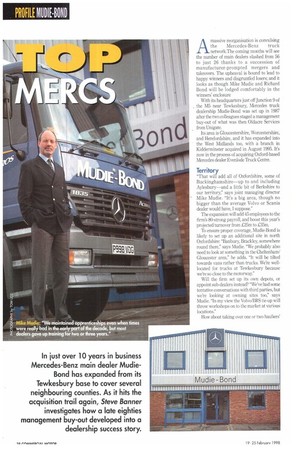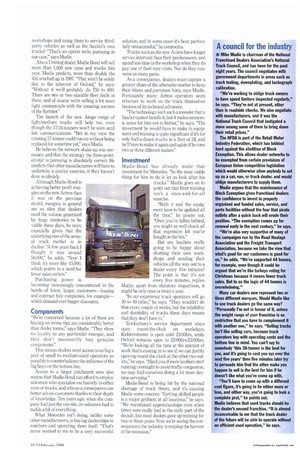PROFILE MUDIROND
Page 40

Page 41

If you've noticed an error in this article please click here to report it so we can fix it.
In just over 10 years in business Mercedes-Benz main dealer MudieBond has expanded from its Tewkesbury base to cover several neighbouring counties. As it hits the acquisition trail again, Steve Banner investigates how a late eighties management buy-out developed into a dealership success story.
Amassive reorganisation is convulsing the Mercedes-Benz truck network.The coming months will see the number of main dealers slashed from 56 to just 26 thanks to a succession of manufacturer-prompted mergers and takeovers. The upheaval is bound to lead to happy winners and disgruntled losers; and it looks as though Mike Mudie and Richard Bond will be lodged comfortably in the winners' enclosure
With its headquarters just off Junction 9 of the M5 near Tewkesbury, Mercedes truck dealership Mudie-Bond was set up in 1987 after the two colleagues staged a management buy-out of what was then Oldacre Services from Unigate.
Its area is Gloucestershire, Worcestershire, and Herefordshire, and it has expanded into the West Midlands too, with a branch in Kidderminster acquired in August 1995. It now in the process of acquiring Oxford-based Mercedes dealer Evenlode Truck Centre.
Territory
That will add all of Oxfordshire, some of Buckinghamshire—up to and including Aylesbury—and a little bit of Berkshire to our territory," says joint managing director Mike Mudie. "It's a big area, though no bigger than the average Volvo or Scania dealer would have, I suppose."
The expansion will add 45 employees to the firm's 80-strong payroll, and boost this year's projected turnover from L25m to £35m.
To ensure proper coverage, Mudie-Bond is likely to set up an additional site in north Oxfordshire: "Banbury, Brackley, somewhere round there," says Mudie. "We probably also need to look at something in the Cheltenham/ Gloucester area," he adds. "It will be tilted towards vans rather than trucks. We're welllocated for trucks at Tewkesbury because we're so close to the motorway."
Will the firm set up its own depots, or appoint sub-dealers instead? "We've had some tentative conversations with third parties, but we're looking at owning sites too," says Mudie. "In my view the Volvo/l3RS tie-up will throw workshops on to the market at various locations."
How about taking over one or two hauliers' workshops and using them to service thirdparty vehicles as well as the haulier's own trucks? "That's an option we're pursuing in one case," says Mudie.
Also a Unimog dealer, Mudie-Bond will sell more than 1,000 new vans and trucks this year, Mudie predicts, more than double the 450 notched up in 1997. "That wbn't be solely due to the takeover of Oxford," he says. "Without it wed probably do 750 to 800. There are one or two sizeable fleet deals in there, and of course we're selling a lot more light commercials with the amazing success of the Sprinter."
The launch of the new Atego range of light/medium trucks will help too, even though the 17/24-tonners won't be seen until late summer/autumn. "But in my view the existing 17-tonner could run on without being replaced for sometime yet," says Mudie.
He believes the network shake-up was necessary, and that the strategy the three-pointed-star is pursuing is absolutely correct. He predicts that other manufacturers will have to undertake a similar exercise, if they haven't done so already.
Although Mudie-Bond is achieving better profit margins on the new Actros than it was on the previous model, margins in general are so slim that dealers need the volume generated by large territories to be viable these days, he says; especially given that the underlying size of the annual truck market is in decline. "A few years back I thought it was around 50,000," he adds. "Now I think it's more like 45,400, which points to a need for fewer sales outlets."
Purchasing power is becoming increasingly concentrated in the hands of fewer, larger, customers—leasing and contract hire companies, for example— which demand ever-bigger discounts.
Components
"We're concerned because a lot of them are buying on terms that are considerably better than dealer terms," says Mudie. "They show no loyalty to any particular marque, and they don't necessarily buy genuine components."
This means dealers need access to as big a pool of small to medium-sized operators as possible to counterbalance the influence of the big boys on the bottom line.
Access to a larger catchment area also means that Mudie-Bond can afford to employ salesmen who specialise exclusively in either vans or trucks, and who as a consequence can better advise customers thanks to their depth of knowledge. Ten years ago, when the company had just the one site, its salesmen had to tackle a bit of everything.
What Mercedes isn't doing, unlike some other manufacturers, is buying dealerships in numbers and operating them itself. "That's never seemed to me to be a very successful solution, and in some cases it's been particularly unsuccessful," he comments.
Trucks such as the new Actros have longer service intervals than their predecessors, and spend less time in the workshop when they do pay one of their rare visits. Nor do they consume as many parts.
As a consequence, dealers must capture a greater share of the aftersales market to keep their fitters and partsmen busy, says Mudie. Fortunately many Actros operators seem reluctant to work on the truck themselves because of its technical advances.
"The technology isn't such a monster that a haulier cannot handle it, but it makes economic sense for him not to bother," he says. "The investment he would have to make in equipment and training is quite significant if it's for only half-a-dozen trucks in a fleet of 24, and he'll have to make it again and again if he runs two or three different makes."
Investment Mudie-Bond has already made that investment for Mercedes. "So the most viable thing for him to do is let us look after his trucks." Mudie goes on to point out that fitter training isn't a once-and-for-all exercise.
"Both it and the equipment have to be updated all the time," he points out. "Once you've fallen behind, you might as well chuck all that expensive kit you've bought in the bin."
But are hauliers really going to be happy about shutting their own workshops and sending their vehicles all the way out to a dealer every five minutes? The point is that it's not every five minutes, replies Mudie; apart from statutory inspections, it might be only once or twice a year.
"In our experience truck operators will go 30 to 40 miles," he says. "They wouldn't do that every couple of weeks, but the reliability and durability of trucks these days means that they don't have to."
Tewkesbury's service department stays open round-the-clock on weekdays: Kidderminster is open until 23:00Iu-s, while Oxford remains open to 22:00hrs/23:00hrs. "We're looking all the time at the amount of work that's coming in to see if we can justify opening round-the-clock at the other two outlets," he says. "Mind you, if more haulier-:
running overnight to avoid traffic cong. . we may find ourselves doing a lot more daytime servicing."
Mudie-Bond is being hit by the national shortage of truck fitters, and it's causing Mudie some concern. "Getting skilled people is a major problem at all locations," he says. "We maintained apprenticeships even when times were really bad in the early part of the decade, but most dealers gave up training for two or three years. Now we're seeing the consequences; the industry is reaping the harvest of the recession."
A council for the industry
* Mike Mudie is chairman of the National Franchised Dealers Association's National Truck Council, and has been for the past eight years. The council negotiates with government departments in areas such as truck testing, downplating. and tachograph calibration.
"We're working to oblige truck owners to have speed limiters inspected regularly," he says. "They're not at present, other than in roadside checks. We also negotiate with manufacturers, and it was the National Truck Council that instigated a move among some of them to bring down their retail prices."
The NFDA is part of the Retail Motor Industry Federation, which has lobbied hard against the abolition of Block Exemption. This allows dealer networks to be exempted from certain provisions of European Union competition legislation which would otherwise allow anybody to set up as a car, van, or truck dealer, and would oblige manufacturers to supply them.
Mudie argues that the maintenance of Block Exemption gives franchised dealers the confidence to invest in properly organised and funded sales, service, and parts facilities without the fear that pirate outlets after a quick buck will erode their position. "The exemption comes up for renewal early in the next century," he says.
"We're also very supportive of many of the campaigns run by the Road Haulage Association and the Freight Transport Association, because we take the view that what's good for our customers is good for us," he adds. "We've supported 44 tonnes, for example, even though it could be argued that we're like turkeys voting for Christmas because it means fewer truck sales. But to us the logic of 44 tonnes is overwhelming."
Many car dealers now represent two or three different marques. Would Mudie like to see truck dealers go the same way? "Personally I'm not in favour of it, unless the weight range of your franchise is so restrictive that you have to complement it with another one," he says. "Selling trucks isn't like selling cars, because truck operators buy with operating costs and the bottom line in mind. You can't say to somebody 'this 38-tonner is the best for you, and it's going to cost you xyz over the next five years' then five minutes later try to persuade him that the other make you happen to sell is the best for him if he doesn't like what you've come up with.
"You'll have to come up with a different cost figure, it's going to be either more or less, and either way, you're going to look a complete prat," he points out.
Mudie believes that used trucks should be the dealer's second franchise. "It is almost inconceivable to me that the truck dealer of the future will be able to operate without an efficient used operation," he says.




































































































